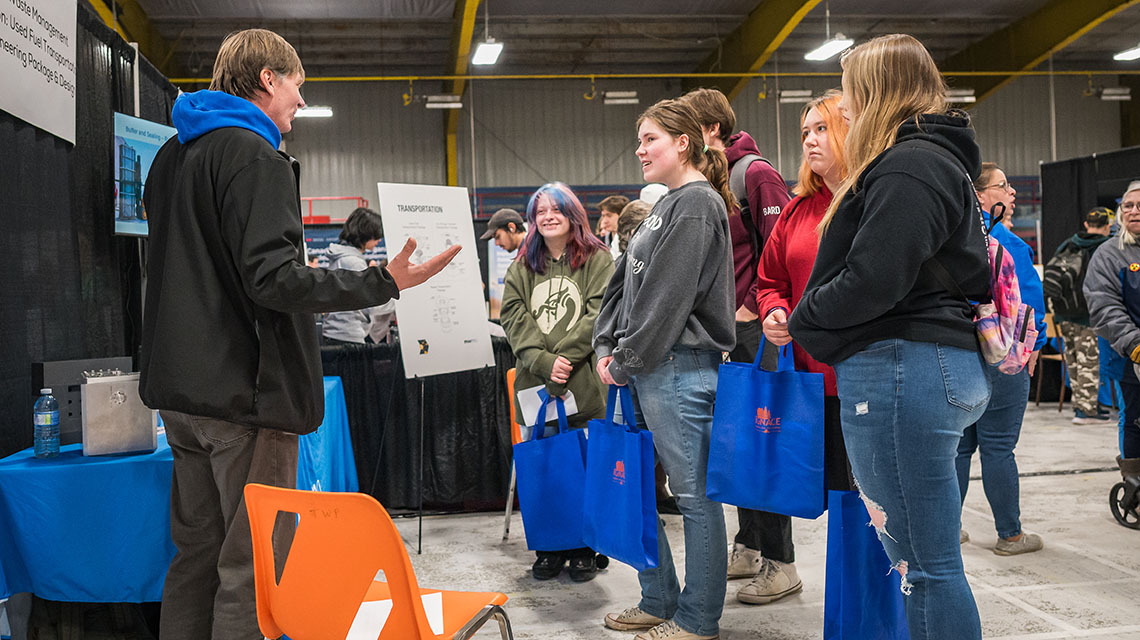Importance of Open Dialogue in Gaining Community Support for Nuclear Projects
The significance of open dialogue with local communities in securing their backing for nuclear power projects was underscored during a side event at the International Atomic Energy Agency’s (IAEA) General Conference. These projects range from power reactors to research laboratories and deep geological repositories for spent nuclear fuel. The IAEA’s Director General, Rafael Mariano Grossi, emphasized the crucial role that host communities play in the nuclear sector, highlighting their importance in energy transitions and the need for substantial local support to ensure the success of nuclear facilities.
Grossi pointed out that the world requires more communities to adopt a “yes in my backyard” approach for nuclear energy to prosper. This perspective is vital as the global energy landscape continues to evolve, necessitating cleaner and more efficient energy sources like nuclear power.
To further this objective, the IAEA has announced the first International Conference on Stakeholder Engagement for Nuclear Power Programmes, set to take place from May 26 to 30, 2025, at its headquarters in Vienna. This conference aims to bring together a diverse array of participants including policymakers, regulators, communication experts, technical support organizations, waste management organizations, community representatives, industry leaders, academic researchers, non-governmental organizations (NGOs), and international agencies. The collaborative platform will serve as a venue for discussing best practices, challenges, and opportunities in engaging stakeholders for nuclear projects.
Community Engagement: Challenges and Success Stories
During the side event, speakers from various countries including Argentina, Canada, Hungary, Japan, and the United States shared insights into the challenges and opportunities faced by communities hosting nuclear facilities. They also highlighted successful engagement stories and lessons learned from these experiences. It was noted that the success of large infrastructure projects, particularly nuclear ones, heavily depends on obtaining a social license, which requires active and open dialogue with all stakeholders, especially local communities. This engagement helps keep projects on track, both in terms of timing and budget, while also addressing community concerns.
One example of successful community engagement came from Ignace, Canada, which recently expressed its willingness to host a deep geological repository (DGR) for the country’s spent nuclear fuel. This decision followed an extensive process emphasizing dialogue and providing resources for the community to understand what hosting a repository entails. Chantal Moore, a member of the Willingness Ad Hoc Committee in Ignace, recounted how the community was brought into discussions as early as 2010 to determine their interest and concerns about hosting a DGR. The National Waste Management Organization (NWMO) worked closely with the municipality to inform residents about the project, resulting in 77% of participants voting in favor of the initiative.
Isaac Werner, Senior Advisor for Government Relations at NWMO, emphasized the importance of voluntary participation, stating that the project would not proceed without the consent of well-informed host communities. The final decision on the preferred location for the DGR is expected by the end of the year.
Local Community Partnerships with Nuclear Facilities
In Idaho Falls, USA, the city hosts the Department of Energy’s Idaho National Laboratory (INL), a major nuclear energy research facility. Mayor Rebecca Casper highlighted the importance of local engagement in such projects, noting that mayors often see themselves as partners in these initiatives. Unlike other stakeholders who may come and go, the local community remains involved for the long term, sometimes spanning a century or more.
Csaba Dohoczki, Vice President of the Group of European Municipalities with Nuclear Facilities, shared an example from Hungary where municipalities collaborated with the operator of the Paks Nuclear Power Plant and the government to improve access to the site. This partnership resulted in the construction of a bridge that connected communities across the river, facilitating job access and service provision for both the community and the nuclear facility.
Addressing Community Concerns and Infrastructure Development
One of the major concerns for host communities is the disruption caused by construction and the challenge of developing infrastructure to support a growing population and economy. In Argentina, the town of Lima in the Zarate municipality, home to the Atucha nuclear power plant and a small modular reactor under construction, exemplifies this scenario. Mayor Marcelo Matzkin explained that while the nuclear projects have brought jobs, good salaries, and new businesses, there is a pressing need to develop adequate infrastructure to support the growing city. The municipality is actively working with the plant operator to address these challenges.
In Japan, Masahiro Sakurai, Mayor of Kashiwazaki, where the country’s largest nuclear power plant is located, pointed out the economic benefits of hosting such facilities, including local employment and national economic growth. However, he also acknowledged the internal divisions within the community regarding support for nuclear projects. These divisions highlight the importance of community consent, especially for restarting reactors that were shut down following the Fukushima Daiichi accident. The Japanese Ministry of Economy, Trade, and Industry, represented by Masahiro Yagi, emphasized ongoing dialogue with municipalities and the provision of tailored support, such as diversifying the industrial structure in areas affected by nuclear plant shutdowns.
Diverse Community Reactions to Different Nuclear Facilities
The type of nuclear facility significantly influences community reactions. German Guido Lavalle, President of Argentina’s National Atomic Energy Commission, noted that while communities might take pride in hosting nuclear power plants, the prospect of establishing a DGR could face considerable opposition. This underscores the necessity for engaging and discussing all kinds of nuclear facilities with local communities to address their concerns and foster understanding.
In conclusion, the IAEA continues to emphasize the importance of stakeholder engagement in the nuclear sector. By fostering open dialogue and collaboration between nuclear facility operators, government bodies, and host communities, the agency aims to ensure the successful implementation and long-term sustainability of nuclear projects worldwide. For more information on participating in the International Conference on Stakeholder Engagement for Nuclear Power Programmes, interested parties can visit the IAEA’s official website.
This movement towards inclusive and transparent engagement is crucial as the world navigates the complexities of energy transitions and works towards a sustainable future powered by nuclear energy.
For more Information, Refer to this article.

































